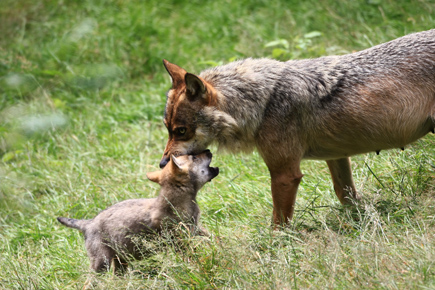For the first time in more than 100 years, the presence of a female wolf has been verified in the Black Forest. Since two male wolves already live in the region, Baden-Württemberg might soon see the first wolf offspring since the extinction of the large carnivores. EuroNatur advocates an objective discussion.

Female wolf with offspring (in Poland): After a very long time, will there perhaps soon be wolf pups in Baden-Württemberg again?
© Jörg PukownikSoon a pack of wolves could be roaming Baden-Württemberg again. However, this prospect is causing unease and refusal among some people in Germany’s southwest. First calls to shoot the wolves and to cap their population were quick to come. The Radolfzell-based nature conservation foundation EuroNatur welcomes the return of the wolves to their ancestral homeland. “Constituting the top of the food web, the wolf plays a crucial role in the ecosystem. Its return positively impacts on the biodiversity of our forests and cultural landscapes,” says Antje Henkelmann, Project Manager for Wolf Conservation at EuroNatur. “At the same time, we take the local people’s concerns seriously.”
In early January, seven dead goats in Münstertal had been reported to the Forest Research Institute (FVA) in Freiburg. Examining the swab samples, the Senckenberg Centre for Wildlife Genetics, was able to assign the lacerations to a female wolf. This incident stirred fears of further wolf kills in the region. But higher numbers of wolves do not automatically lead to more farm animals being killed. “Experience from other parts of Europe, where there are far more wolves than in our region, clearly shows that herd guarding measures make predation on farm animals decrease,” says Antje Henkelmann. “The very high number of prey animals in the wild means that well-protected farm animals are not overly attractive to wolves. Should there nevertheless be any kills by wolves, the affected livestock farmers can be compensated within the framework of a compensation fund,” says the project manager. Together with other stakeholders from Baden-Württemberg, EuroNatur is a member of the “Compensation fund for wolf damage”.


